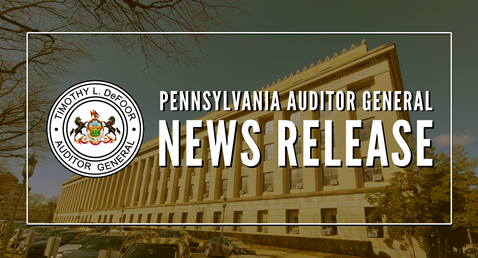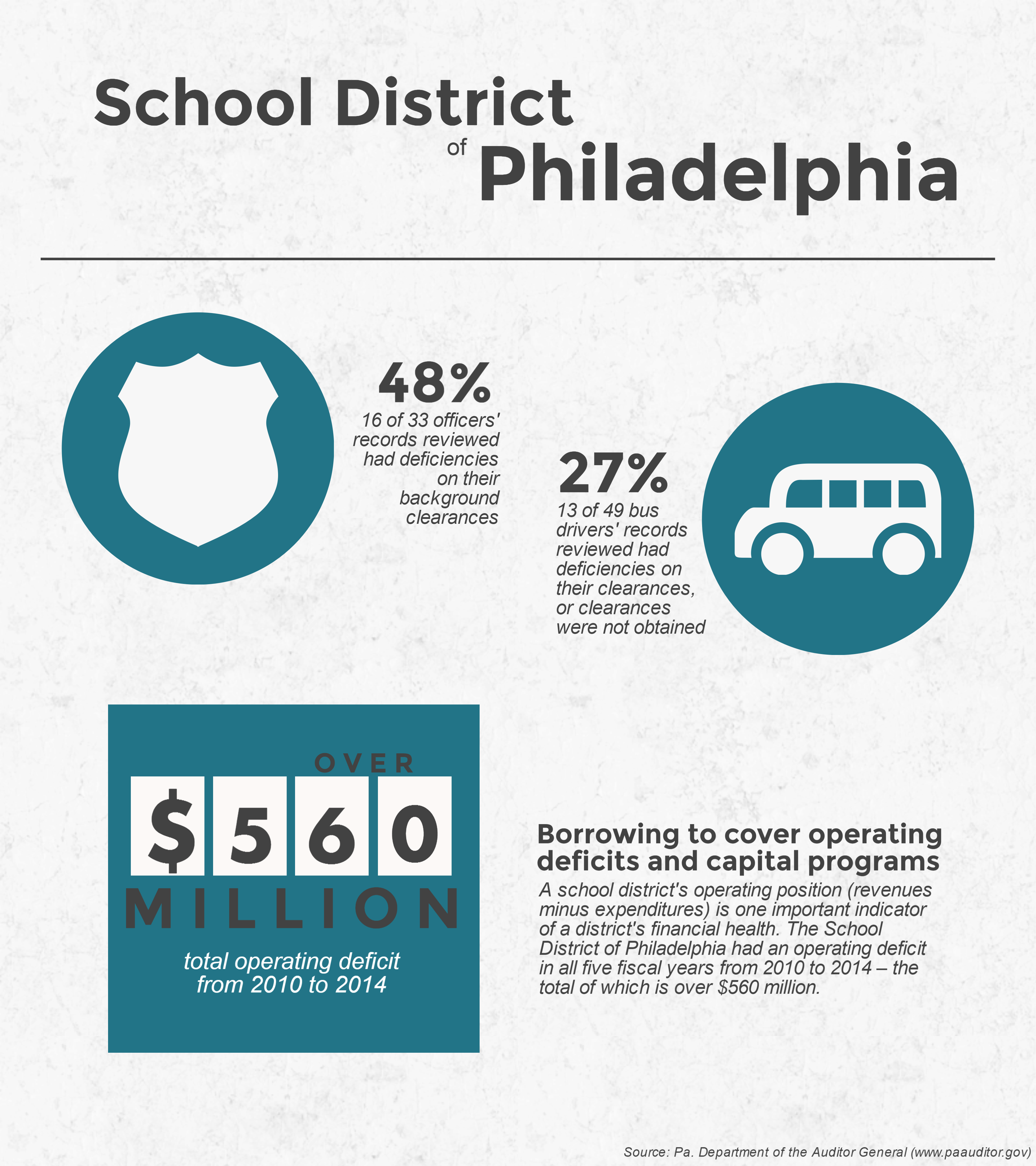Auditor General DePasquale Finds Problems with Philadelphia School District’s Background Checks for School Police Officers, Bus Drivers

Auditor General DePasquale Finds Problems with Philadelphia School District’s Background Checks for School Police Officers, Bus Drivers
District continues to battle serious, persistent financial challenges that require collaborative solutions
PHILADELPHIA (May 11, 2016) – Auditor General Eugene DePasquale today said a recent audit shows the School District of Philadelphia failed to ensure complete criminal background checks and child-abuse clearances are conducted for school police officers and bus drivers.
The audit also shows that the district continues to face persistent financial challenges. The district will plunge further into red ink just to keep classrooms open unless there is a strong collaborative effort by public officials at all levels of government for a commitment to change the current funding structure for the sake of the district’s nearly 200,000 students.
“Financially, the whole system for funding the School District of Philadelphia is broken,” DePasquale said. “Many, but not all, of the financial issues are beyond the district’s ability to resolve on its own. What’s needed is an all-hands-on-deck commitment from local, state and federal leaders to work with the district to develop solutions to address its financial challenges and be a good steward of public funds.
“Meanwhile, the district needs to improve its work on bus driver and school police officer background checks, school police training, employee contracts and data collection.”
The 84-page audit report has six findings and 24 recommendations. Four of the findings are repeats from the district’s prior audit released in March 2011.
“These findings are not insurmountable,” he said.
Nearly half of background checks incomplete for bus drivers, school police officers
In a review of bus driver background checks, auditors note that 21 of 49 bus drivers records reviewed, or 43 percent, failed to meet at least one employment requirement, with the majority involving missing or untimely state criminal history, federal criminal history and/or child-abuse clearances. A similar finding was noted in the district’s prior audit.
The district has more than 1,100 bus drivers employed either by the district or by contracted transportation companies.
“Even more alarming than the missing background checks and clearances is the fact that we found two of those 49 bus drivers have pre-employment convictions that should have precluded them from ever coming into contact with children,” DePasquale said.
Auditors found a third contracted bus driver who was eligible for employment at the time of hire but should have been deemed ineligible when the Public School Code changed in 2011 requiring districts to consider convictions as far back as 10 years.
“These people had convictions for aggravated assault, arson and drug possession, and yet they were permitted to transport students,” he said. “That is unacceptable.”
DePasquale notes that one of the drivers was terminated, in August 2015, after auditors informed the district of the conviction that was discovered in our review, while the two others were employed by a bus contractor whose contract was terminated by the district in November 2015.
For school police officers, 16 of the 33 officer records reviewed, or 48 percent, had at least one deficiency related to the three background clearances for state and federal criminal histories and child-abuse clearances. As of December 2014, the district employed 337 school police officers.
“We found similar deficiencies in the previous audit. School police officers walk the halls of the district’s schools and yet this time we found nearly half of the officers we reviewed had incomplete background checks,” DePasquale said. “If you are a Little League coach, you cannot set one foot on the field without the proper clearances, but the same cannot be said for Philadelphia school police officers.”
Auditors also found that the district hired 72 new officers between July 2011 and December 2014 without requiring completion of the Municipal Police Officers’ Education and Training Program prior to employment as required by the Public School Code. The 750-hour training program covers all aspects of law enforcement ranging from laws and procedures to crisis management and first aid. These new hires represent nearly 25 percent of the school police officers employed by the district as of December 2014.
“School police officers, especially those in a district the size of the School District of Philadelphia, must be properly qualified and well trained to respond to the volume and kinds of incidents occurring in its schools,” DePasquale said. “Having improperly qualified or insufficiently trained school police officers could compromise the safety of the district’s students, teachers and staff.
“Our audit identified these issues. If they have not already started the process, I strongly urge the district to conduct a full and careful review of the records of all its bus drivers and police officers,” he said.
Financial challenges continue
Auditors note that, for the five years covered in the audit, the district had a structural deficit totaling $560,165,745 – more than half a billion dollars.
“For the fiscal year 2013-14 alone, the district paid more than $265 million to cover payments on its borrowing, and more than $146 million of that amount is for the interest alone,” DePasquale said. “The district is consistently paying more each year in interest than it is on the loan principal. That’s a scenario that is just not sustainable.
“To their credit, the district is trying to get control of its financial situation, but since district officials have no direct control over local revenue sources, their hands are tied,” DePasquale said.
The district’s local revenue makes up only 33 percent of its budget compared with 70 percent for most other Pennsylvania school districts, making the School District of Philadelphia rely heavily on state and federal subsidies, which fail to adequately cover expenses.
“While other school districts in Pennsylvania have the ability to raise local taxes to support schools, Philadelphia does not have the independent ability to increase tax rates; the direct taxing authority lies with the General Assembly and the Philadelphia City Council,” DePasquale said.
One of the key stressors on the district’s budget is its state-mandated support for charter schools. The district’s charter school tuition expenditures increased by 107 percent during the audit period – from $333.5 million in 2009-2010 to $701.3 million in 2013-14. Charter schools accounted for 25 percent of the district’s operating expenditures in 2013-14.
“What is needed is coordinated commitment and direction by local Philadelphia elected and appointed officials, the governor, and the General Assembly to work to give the district the tools it needs to deal with its financial issues,” he said. “Without such action, the district will continue on an extremely challenging financial path. The current business model clearly is not working.
“Our audit shows, operational improvements are necessary so the school district can focus on educational issues. But we need to recognize that one of the nation’s largest school districts is facing a huge structural deficit and mounting debt payments without the local taxing authority we give every other school district in Pennsylvania.”
Unreliable student data submitted to Pennsylvania Department of Education (PDE)
The audit notes a lack of permanent student records (hardcopy documentation) to support data submitted to PDE and discrepancies between teacher classroom roll documents and reports submitted by the district to PDE’s student data system. Attendance data for 65 percent of students reviewed was unsupported.
“Without accurate records, it is difficult to determine if students were truant or not,” DePasquale said. “Inaccurate student data also could result in state subsidy overpayments or underpayments.
“The district’s failure to maintain accurate student data has been a continual problem, as we found similar issues during our prior audits dating to the 1990s,” he said, noting that he is encouraged that the district is attempting to correct the student data deficiencies by moving to an electronic attendance-taking system.
Superintendent performance review and staff contract missing
Auditors found that the district’s School Reform Commission, which performs the same function as a typical elected school board, failed to conduct timely performance evaluations of the superintendent and did not enter into an employment contract with the deputy superintendent.
Public School Code amendments enacted in 2012 require all superintendents and assistant [or deputy] superintendents to have a written employment contract with specific provisions, including performance standards. The deputy superintendent began employment after the effective date of the amendments so therefore the deputy would have been covered under the law.
“I understand that the individual who held the position of deputy superintendent is no longer with the district,” DePasquale said. “Hopefully, if the district officials decide to fill this position at a later date, they will follow proper procedures and enter into a formal employment contract with the individual selected for the position.”
Failure to maintain proper textbook inventory
Auditors note that the district stored hundreds of thousands of books in a closed school building for approximately two years after the district’s closure of 23 school buildings.
The fact the district did not have an automated textbook inventory system compounded the problem of having to account for the volume of surplus books and educational materials resulting from these closures.
“While this lack of a proper inventory kept books in storage for two years when they could have been used in classrooms, I am encouraged that the district says it has now created an online inventory system that will enable it to track the textbooks and help get the materials to the classrooms that need them,” DePasquale said.
Needed: Action in Harrisburg
“What we have learned from this audit and the one released last month of the district’s charter school office is this: Harrisburg has caused many of the problems faced by the School District of Philadelphia, and political leaders in Harrisburg must be involved in fixing them,” DePasquale said. “Obviously, the district has plenty of work to do on its own, but unless we truly have an all-out effort by everyone involved, the largest school district in the largest city in Pennsylvania could be on the brink of disaster. That would be devastating to students, parents, teachers and to Pennsylvania as a whole.”
The latest audit follows on the heels of one released last month of the districts’ oversight and monitoring of its 86 district-authorized charter schools. That audit showed a clear need for the governor and the General Assembly to reform the two-decade-old charter school law.
The School District of Philadelphia audit report is available online at: www.PaAuditor.gov.
# # #
Return to search results
